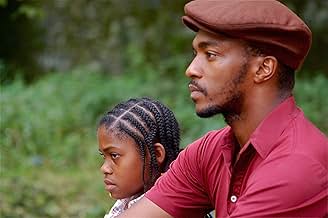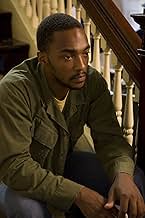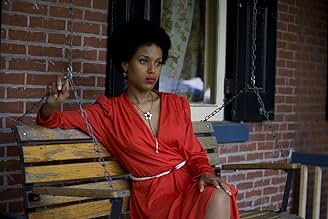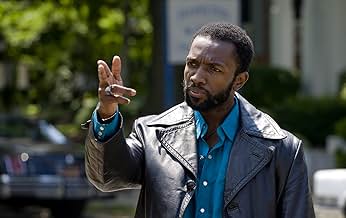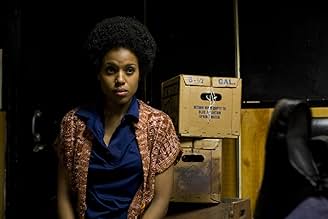CALIFICACIÓN DE IMDb
6.2/10
1.9 k
TU CALIFICACIÓN
Agrega una trama en tu idiomaIn 1976, complex political and emotional forces are set in motion when a young man returns to the race-torn Philadelphia neighborhood where he came of age during the Black Power movement.In 1976, complex political and emotional forces are set in motion when a young man returns to the race-torn Philadelphia neighborhood where he came of age during the Black Power movement.In 1976, complex political and emotional forces are set in motion when a young man returns to the race-torn Philadelphia neighborhood where he came of age during the Black Power movement.
- Premios
- 8 premios ganados y 19 nominaciones en total
- Dirección
- Guionista
- Todo el elenco y el equipo
- Producción, taquilla y más en IMDbPro
Opiniones destacadas
"Night Catches Us" is the best art-house film I've seen in several months. In fact it bests a lot of the current main-screen fare. It deserves better than the quiet and uneven release it seems destined for.
I saw it back-to-back with the Oscar contender "The King's Speech". It balanced the double bill reasonably well. Although "The King's Speech" is of course superior, the comparison wasn't simply ridiculous.
I saw it twice ...which I often do with films I really like, as I tend to miss too many things the first time.
It's not moralistic. Both sides of survival vs. justice, violence vs. pacifism, united front vs. paranoia, victims vs. victimizers, and this generation vs. the next generation are portrayed sympathetically. Although at first glance one particular style of being seems to be being touted over the others, just a little reflection reveals that the film actually revels in moral ambiguity. Some characters manage to stay on the good side of the respectability line at all times, even while their inner demons are picked up and expressed -sometimes in socially unacceptable ways- by others around them. The camera notices more latent contradictions than the story ever delves into. For example the reverend was apparently beloved by the neighborhood, yet also lived in by far the finest house in the whole area.
The film isn't a polemic and doesn't seem to consciously attempt to portray cops in a bad light. Yet it doesn't shy away from sketches of substantial police bad attitude and violence.
"Night Catches Us" makes liberal use of art-house stylistic conventions. For example the confused, tangled, and partially submerged thoughts of a character are portrayed not by talking about them or even by seeing them in action, but by long leisurely shots from underneath of the crossed branches of overgrown vegetation. For another example, a character's longing for stability and tranquility is portrayed by lengthy shots of the proverbial babbling brook.
I wasn't irritated by the pacing. The film is by no means an action flick or a taut thriller, but I didn't find it like watching paint dry either. I tend to like slower paced films anyway (which of course doesn't mean everybody else will too:-). The most similarly paced movie that comes to mind is Clint Eastood's recent "Hereafter"; if you thought that was impossibly slow you'll probably have the same reaction to "Night Catches Us", but if that character exposition and portrayal of small events grabbed you this likely will too.
All the action takes place over just a few days in 1976. A block of important events that happened about a decade earlier is described mainly through bits of dialog. There are no visual flashbacks nor dream sequences (except of course for the occasional interspersed archival Black Panthers footage).
I found the acting quite good. It doesn't bowl you over as the greatest thing you've seen in years; but it's by no means "just workmanlike". Quite often meaning is communicated not by dialog but by subtle body language or facial expressions, which the actors seem fully up to. Both the individual characters and the chemistry between the characters are believably convincing.
I found the situation (or plot if you prefer to think of it that way) simple and complex at the same time. It's simple in that once you finally grasp it you can describe the whole thing in one short paragraph, and in that if you're one of those people who instantly "get" most movie clues you might be able to divine the whole thing well in advance. On the other hand it's complex in that it's revealed only one tiny bit at a time -sometimes in dialog and sometimes visually- so the whole movie can become a "mystery" to be solved if that's your preference.
I saw it back-to-back with the Oscar contender "The King's Speech". It balanced the double bill reasonably well. Although "The King's Speech" is of course superior, the comparison wasn't simply ridiculous.
I saw it twice ...which I often do with films I really like, as I tend to miss too many things the first time.
It's not moralistic. Both sides of survival vs. justice, violence vs. pacifism, united front vs. paranoia, victims vs. victimizers, and this generation vs. the next generation are portrayed sympathetically. Although at first glance one particular style of being seems to be being touted over the others, just a little reflection reveals that the film actually revels in moral ambiguity. Some characters manage to stay on the good side of the respectability line at all times, even while their inner demons are picked up and expressed -sometimes in socially unacceptable ways- by others around them. The camera notices more latent contradictions than the story ever delves into. For example the reverend was apparently beloved by the neighborhood, yet also lived in by far the finest house in the whole area.
The film isn't a polemic and doesn't seem to consciously attempt to portray cops in a bad light. Yet it doesn't shy away from sketches of substantial police bad attitude and violence.
"Night Catches Us" makes liberal use of art-house stylistic conventions. For example the confused, tangled, and partially submerged thoughts of a character are portrayed not by talking about them or even by seeing them in action, but by long leisurely shots from underneath of the crossed branches of overgrown vegetation. For another example, a character's longing for stability and tranquility is portrayed by lengthy shots of the proverbial babbling brook.
I wasn't irritated by the pacing. The film is by no means an action flick or a taut thriller, but I didn't find it like watching paint dry either. I tend to like slower paced films anyway (which of course doesn't mean everybody else will too:-). The most similarly paced movie that comes to mind is Clint Eastood's recent "Hereafter"; if you thought that was impossibly slow you'll probably have the same reaction to "Night Catches Us", but if that character exposition and portrayal of small events grabbed you this likely will too.
All the action takes place over just a few days in 1976. A block of important events that happened about a decade earlier is described mainly through bits of dialog. There are no visual flashbacks nor dream sequences (except of course for the occasional interspersed archival Black Panthers footage).
I found the acting quite good. It doesn't bowl you over as the greatest thing you've seen in years; but it's by no means "just workmanlike". Quite often meaning is communicated not by dialog but by subtle body language or facial expressions, which the actors seem fully up to. Both the individual characters and the chemistry between the characters are believably convincing.
I found the situation (or plot if you prefer to think of it that way) simple and complex at the same time. It's simple in that once you finally grasp it you can describe the whole thing in one short paragraph, and in that if you're one of those people who instantly "get" most movie clues you might be able to divine the whole thing well in advance. On the other hand it's complex in that it's revealed only one tiny bit at a time -sometimes in dialog and sometimes visually- so the whole movie can become a "mystery" to be solved if that's your preference.
Night Catches Us (2010)
A really fascinating look at an African-American reality in Philadelphia in 1976. The plot hook is more sensational than the movie itself—a former Black Panther returning home has to adjust to regular life and accusations of tattling. What really grips you, though, is the "regular life" part, because the acting and direction make this all feel honest and revealing. A slice of life done well.
If the core of the movie is how Blacks of different attitudes and philosophies learn to get along (and not get along) with each other, there is also the more expected acrimony between the Black community and the mostly White cops patrolling it. It's hard to know how accurate this part is, because here we are shown clichés of some very dumb and mean and hardheaded white cops, and maybe that was the norm. I'd like to think that some other movies have it right when there are those bad eggs on the force, but that many make an effort to get along and be reasonable with the people they are protecting.
But maybe one message of the movie taken whole is just how different it was back then, in the shadow of the truly radical and violent 1960s, as the Muslim influence was rising, as power was promising to shift more evenly between groups but was lurching too slowly. Maybe it was just filled with such distrust it led to caricatures for real. There are several segments of archival footage of Panthers and other protesting, and the gritty roughness of those scenes reveals some kind of glossing over of the situation for this fictional version made 35 years later.
The leading actor, Anthony Mackie, and leading actress, Kerry Washington, are both likable and excellent. You might say too likable and excellent—there is a modern feel to their demeanors that's hard to put your finger on. But they're both a joy to watch act and interact. The intentions are low key, and the result is easy going despite the tensions around them. It's a love story after all! Writer and director Tanya Hamilton is making her first feature film here, and she makes the most of her modest intentions.
As a commentary on race relations it is nearly the opposite of Spike Lee's approaches in their highly produced flair. And whatever the limitations of the film and its script, it has the net gain of a feeling of sincerity. Which goes a long way.
A really fascinating look at an African-American reality in Philadelphia in 1976. The plot hook is more sensational than the movie itself—a former Black Panther returning home has to adjust to regular life and accusations of tattling. What really grips you, though, is the "regular life" part, because the acting and direction make this all feel honest and revealing. A slice of life done well.
If the core of the movie is how Blacks of different attitudes and philosophies learn to get along (and not get along) with each other, there is also the more expected acrimony between the Black community and the mostly White cops patrolling it. It's hard to know how accurate this part is, because here we are shown clichés of some very dumb and mean and hardheaded white cops, and maybe that was the norm. I'd like to think that some other movies have it right when there are those bad eggs on the force, but that many make an effort to get along and be reasonable with the people they are protecting.
But maybe one message of the movie taken whole is just how different it was back then, in the shadow of the truly radical and violent 1960s, as the Muslim influence was rising, as power was promising to shift more evenly between groups but was lurching too slowly. Maybe it was just filled with such distrust it led to caricatures for real. There are several segments of archival footage of Panthers and other protesting, and the gritty roughness of those scenes reveals some kind of glossing over of the situation for this fictional version made 35 years later.
The leading actor, Anthony Mackie, and leading actress, Kerry Washington, are both likable and excellent. You might say too likable and excellent—there is a modern feel to their demeanors that's hard to put your finger on. But they're both a joy to watch act and interact. The intentions are low key, and the result is easy going despite the tensions around them. It's a love story after all! Writer and director Tanya Hamilton is making her first feature film here, and she makes the most of her modest intentions.
As a commentary on race relations it is nearly the opposite of Spike Lee's approaches in their highly produced flair. And whatever the limitations of the film and its script, it has the net gain of a feeling of sincerity. Which goes a long way.
Night Catches Us (2010) is a movie I recently watched on Tubi. The storyline follows a man who returns home to his neighborhood after his father passes away. He wants to help his family fix-up the house but quickly comes to the realization he isn't wanted around by his former friends or family. There is one single mother who appreciates who he was and who he is and together they try to overcome some of their inner demons. This movie is directed by Tanya Hamilton (The Chi) in her directorial debut and stars Kerry Washington (Scandal), Anthony Mackie (Avengers), Ron Simons (27 Dresses) and Tariq Trotter (Yelling to the Sky). The storyline for this picture is very interesting and fun to watch unfold. There's numerous mysteries of each other's pasts for the two main characters that keep the audience intrigued. The acting is very good as is the cinematography, settings and backdrops. The character interactions also have the appropriate level of intensity. Overall, this is far from one of the best movies in this genre but is still worth a viewing. I'd score this a 6.5-7/10.
I'd encourage anyone interested in watching good acting and film-making to watch "Night Catches Us".
The movie is set in 1976, in Philadelphia, and it is not "Rocky's" S. Philadelphia. The main characters have all had experience/involvement in the Black Panther movement, and the movie cuts a path through the complex feelings and realities that have evolved since they were once involved with it.
It's one of those films that revolves around a core group of characters who've all turned into somewhat different people from when they first knew each other. The dynamic is even more intense because each of the main characters has a tie-in to someone who was obviously a leader or loved one -- indeed it was his death years earlier that led the group to disperse.
I'm kinda bummed that awards seasons might be passing by this gem. Kerry Washington is great, but it's Anthony Mackie's film; he has an intensity and dignity. No overwrought acting.
The movie is set in 1976, in Philadelphia, and it is not "Rocky's" S. Philadelphia. The main characters have all had experience/involvement in the Black Panther movement, and the movie cuts a path through the complex feelings and realities that have evolved since they were once involved with it.
It's one of those films that revolves around a core group of characters who've all turned into somewhat different people from when they first knew each other. The dynamic is even more intense because each of the main characters has a tie-in to someone who was obviously a leader or loved one -- indeed it was his death years earlier that led the group to disperse.
I'm kinda bummed that awards seasons might be passing by this gem. Kerry Washington is great, but it's Anthony Mackie's film; he has an intensity and dignity. No overwrought acting.
The late Sixties found people in life quandaries they could not have imagined based on how they were raised. As the US government continued to kill thousands in other countries they turned also upon their citizens and sought to dampen dissent through the murder of those on what they defined to be the fringes of society. The Black Panthers, Students for A Democratic Society, the Weather Underground, students at Jackson State, Kent State; members found political commitments tied to life and death decisions. How far does one go to dissent? To what does one commit oneself with all their heart and soul? What price is one willing to pay when the corruption and moral bankruptcy of one's nation is no longer tolerable. "Night Catches Us"illuminates the maze of personal and political commitments necessary for living through those times. People no longer put their lives on the line in quite the same way. The US continues to murder thousands across the globe but the protest is only seen on cable television. Gil Scott Heron could not have realized that in the end the revolution would be televised. It just wouldn't have any real impact or foment real change.
¿Sabías que…?
- TriviaThis movie reunites Anthony Mackie and Kerry Washington who previously starred together in Spike Lee's 2004 film 'She Hate Me.'
- ErroresThe film is supposed to take place in 1975, but the blue Chevy Caprice police car is a 1986-1990 model.
- ConexionesReferenced in IMDb's 20th Anniversary Star of the Day: Anthony Mackie (2010)
Selecciones populares
Inicia sesión para calificar y agrega a la lista de videos para obtener recomendaciones personalizadas
- How long is Night Catches Us?Con tecnología de Alexa
Detalles
- Fecha de lanzamiento
- País de origen
- Sitios oficiales
- Idioma
- También se conoce como
- Stringbean and Marcus
- Locaciones de filmación
- Productoras
- Ver más créditos de la compañía en IMDbPro
Taquilla
- Total en EE. UU. y Canadá
- USD 76,185
- Fin de semana de estreno en EE. UU. y Canadá
- USD 13,562
- 5 dic 2010
- Total a nivel mundial
- USD 76,185
- Tiempo de ejecución1 hora 30 minutos
- Color
- Mezcla de sonido
Contribuir a esta página
Sugiere una edición o agrega el contenido que falta


